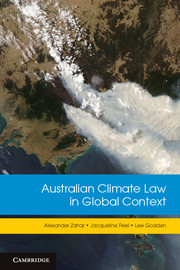Book contents
- Frontmatter
- Contents
- Acknowledgments
- Abbreviations and definitions
- Figures, tables and boxes
- Table of cases
- Table of statutes
- Table of treaties and other international instruments
- Introduction
- 1 Climate law
- 2 Legal elements and ongoing development of the international climate change regime
- 3 Measurement and verification of state emissions and legacy of the Kyoto Protocol’s compliance system
- 4 Development of climate law in Australia
- 5 Putting a price on carbon
- 6 The regulatory network of the Clean Development Mechanism
- 7 The emerging scheme for the protection of forests in developing countries (REDD)
- 8 Climate finance, technology transfer and capacity-building for sustainable development
- 9 Legal and regulatory frameworks for transition to a low-carbon economy
- 10 Biosequestration and emission reduction regulation in the Australian land sector
- 11 Adaptation to climate change through legal frameworks
- Postscript
- Bibliography
- Index
- References
11 - Adaptation to climate change through legal frameworks
Published online by Cambridge University Press: 05 December 2012
- Frontmatter
- Contents
- Acknowledgments
- Abbreviations and definitions
- Figures, tables and boxes
- Table of cases
- Table of statutes
- Table of treaties and other international instruments
- Introduction
- 1 Climate law
- 2 Legal elements and ongoing development of the international climate change regime
- 3 Measurement and verification of state emissions and legacy of the Kyoto Protocol’s compliance system
- 4 Development of climate law in Australia
- 5 Putting a price on carbon
- 6 The regulatory network of the Clean Development Mechanism
- 7 The emerging scheme for the protection of forests in developing countries (REDD)
- 8 Climate finance, technology transfer and capacity-building for sustainable development
- 9 Legal and regulatory frameworks for transition to a low-carbon economy
- 10 Biosequestration and emission reduction regulation in the Australian land sector
- 11 Adaptation to climate change through legal frameworks
- Postscript
- Bibliography
- Index
- References
Summary
Introduction
Much of the focus in climate law to date has been on mitigation approaches for decreasing greenhouse gas emissions in the atmosphere and minimising their effects. Until recently, adaptation has received much less attention. In general terms, adaptation means action to manage the consequences of a changed climate and reduce human vulnerability to the effects of climate change. There was early concern that a focus on adaptation would distract from efforts to mitigate climate change. Now mitigation and adaptation are recognised as ‘interdependent policy strategies’. A sharp demarcation between them is regarded as unhelpful, although the extent to which each is given priority in any given circumstance will vary. Adaptation can take many different forms according to how responses to climate change are conceived and implemented. Law has a pivotal role in identifying risks, and in formulating and implementing adaptation responses.
This chapter considers the manner in which legal frameworks can facilitate adaptation to climate change, given the increasing effects felt around the world. It explores the general nature of adaptation and how this concept has been translated into law, before turning to focus on specific case studies of law and adaptation in Australia and the Pacific region. These scenarios deal with coastal impacts and sea-level rise, water governance to account for increased variability, natural disasters, and the displacement of communities. Although grounded in local circumstances, they will confront many communities across the globe.
- Type
- Chapter
- Information
- Australian Climate Law in Global Context , pp. 373 - 409Publisher: Cambridge University PressPrint publication year: 2012



